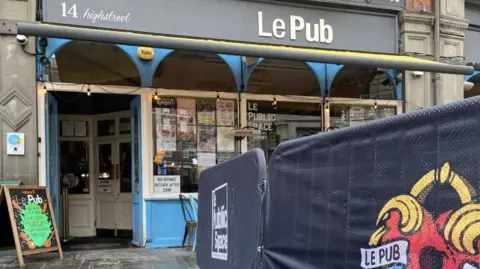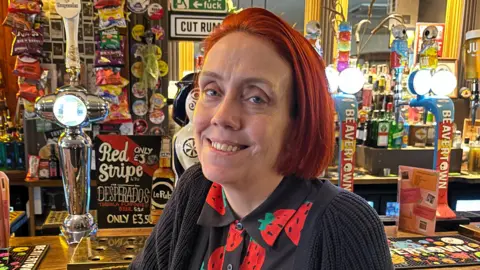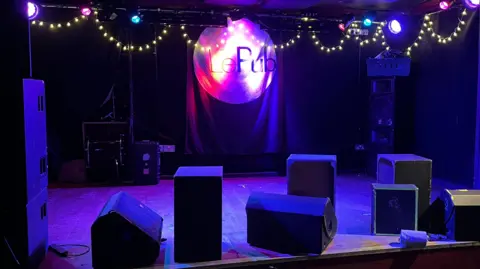Music venue saved but others 'on knife edge'
 BBC
BBCLive music venues are operating on "a knife edge" and need more support from big players in the industry if they are to survive, says the manager of one whose future has now been secured.
Le Pub in Newport has played host to hundreds of emerging and established artists such as Goldie Lookin Chain, Skindred and Adwaith, since opening its doors in 1992.
It has now been bought by a community enterprise, Music Venue Properties (MVP), which aims to protect live music locations.
But many similar venues have closed in recent years, according to campaigners, who say that a levy on large music arenas would help fund and safeguard the future of smaller ones.
Le Pub now becomes the fifth UK music venue to be purchased by MVP, following The Bunkhouse in Swansea and locations in Manchester, Preston and Dover.
MVP is a community benefit scheme, created by the Music Venue Trust, which has used crowdfunding and funds from more than 1,300 investors to buy the grassroots music venues in order to keep them in use.
Matthew Otridge, chief operating officer of MVP, said Le Pub had long been an important venue and that he was "grateful to be part of this amazing story".
Sam Dabb has worked at Le Pub for more than 20 years, and fondly recalls the 1990s as a booming period for musicians from the Newport area – but says her fondest memories are not just seeing those that went on to further success.
"Some of them have gone on to do massive things, but it's not always those who stick out for me," she said.
"People get together, play songs for a few years, and then they're friends for life. So it's more about building the community and enabling friendships between like-minded people."
Although her venue's future is now secure, the same cannot be said of many others – with places such as Gwdihw and The Full Moon in Cardiff among those that have shut their doors in recent years.

"Grassroots music venues all operate on a knife edge, even the ones who are successful," said Ms Dabb.
"It's terrifying as a venue operator to lie awake thinking 'have I got the money for the wages this week?"
She added that a "levy on arenas" was needed.
"If you look at football, for example, all of the big clubs invest heavily in grassroots, because they know if they don't, there'll be no new footballers coming through," she said.
"The big players in the music industry need to start realising that.
"There was a statistic last week… that not a single British artist cracked the Top 10 [bestselling artists of 2024] because the investment in grassroots is not there.
"They're missing out on places to perform, they're missing out on places to build their charisma. You can't just walk on stage in front of 5,000 people and pull it off, you have to play those little places first."

Jack Perrett from Newport, a member of the band Eurekas, first played at Le Pub's old location before it moved to its current premises in the city centre in 2017.
"It's the first stepping stone to any great band – they don't just start at big stadiums and arenas. It's places like this, that's why it's so important to a community," he said.
"The people who come to watch you at smaller venues, they really appreciate that you're trying to hone your craft, and audiences are really respectful – everyone's got to start somewhere."
A gig on Friday night to celebrate Le Pub's new chapter will feature all-female punk pop band Murder Club, whose members formed through their association with the bar.
Drummer Elisha Djan says smaller venues offer value to artists and music fans.
"You kinda get bragging rights, seeing a band at a smaller venue before they go off to be big," she said.
"But also it's nice to see that you supported them from the start."
